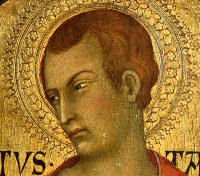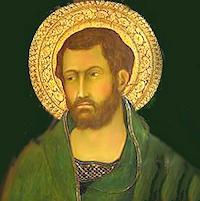» Enjoy our Liturgical Seasons series of e-books!
Today the Church celebrates the feast of the Apostles Saints Simon and Jude. Their names occur together in the Canon of the Mass and are also celebrated on the same day. They may be paired together because they both preached the Gospel in Mesopotamia and Persia where it is said they had both been sent, but in actual fact we know nothing for certain about them beyond what is told us of their being called as Apostles in the New Testament. St. Jude is the author of a short Epistle which forms part of the New Testament.
Sts. Simon and Jude
 However meagre in details is the history of these glorious apostles, we learn from their brief legend how amply they contributed to this great work of generating sons of God. Without any repose, and even to the shedding of their blood, they "edified the body of Christ"; and the grateful Church thus prays to our Lord today: "O God, through the work of the apostles you have spoken your Word of love, your Son, into our world's deafness. Open our ears to hear; open our hearts to heed; open our will to obey, that we may proclaim the good news with our lives."
However meagre in details is the history of these glorious apostles, we learn from their brief legend how amply they contributed to this great work of generating sons of God. Without any repose, and even to the shedding of their blood, they "edified the body of Christ"; and the grateful Church thus prays to our Lord today: "O God, through the work of the apostles you have spoken your Word of love, your Son, into our world's deafness. Open our ears to hear; open our hearts to heed; open our will to obey, that we may proclaim the good news with our lives."
St. Simon is represented in art with a saw, the instrument of his martyrdom. St. Jude's square points him out as an architect of the house of God. St. Paul called himself by this name; and St. Jude, by his Catholic Epistle, has also a special right to be reckoned among our Lord's principal workmen. But our apostle had another nobility, far surpassing all earthly titles: being nephew, by his father Cleophas or Alpheus, to St. Joseph, and legal cousin to the Man-God, Jude was one of those called by their compatriots the brethren of the carpenter's Son. We may gather from St. John's Gospel another precious detail concerning him. In the admirable discourse at the close of the last Supper, our Lord said: "He that loveth Me, shall be loved of My Father: and I will love him and will manifest Myself to him." Then Jude asked Him: "Lord, how is it, that Thou wilt manifest Thyself to us, and not to the world?" And he received from Jesus this reply: "If any one love Me, he will keep My word, and My Father will love him, and We will come to him, and will make Our abode with him. He that loveth Me not keepeth not My word. And the word which you have heard is not Mine, but the Father's who sent Me."
The churches of St. Peter in Rome and Saint-Sernin at Toulouse dispute the honor of possessing the greater part of their holy remains.
—Excerpted from The Liturgical Year, Abbot Gueranger O.S.B.
St. Jude:
Patronage: Desperate situations; forgotten causes; hospital workers; hospitals; impossible causes; lost causes; diocese of Saint Petersburg, Florida.
Symbols and Representation: Bearded man holding an oar, a boat, boat hook, a club, an axe or a book; nearly every image depicts him wearing a medallion with a profile of Jesus, and usually with a small flame above his head; often carries a pen or sits at a writing location to make reference to the canonical Epistle; sailboat; inverted cross; square; halbert; club; loaves and fish; long cross; knotted club; boat hook; fuller's bat; lance; saw; flail; closed book; shield: red with sailboat with a cross on the mast.
St. Simon:
Patronage: Curriers; sawmen; sawyers; tanners.
Symbols and Representation: Boat; fish; man being sawn in two longitudinally; fish and book; oar; saw; two fishes; lance; fuller's bat; axe; cross; saw and oar saltire; fish on a boat hood; sword; shield: red background with two oars and a hatchet.
Highlights and Things to Do:
- Both of these apostles have struggled with mistaken identities with other apostles. Simon is also the name of Simon Peter, and Jude was often spelled "Judas" and so confused with Judas Iscariot, the traitor. Because of the mixup of names, St. Jude was not invoked for a long time. But through his intercession St. Jude helped several saints in very large or hopeless matters, so his reputation began as the patron of impossible causes.
- Read the Epistle of St. Jude.
- Read more about these two Apostles:
- The relics of Sts. Simon and Jude are located in St. Peter's Basilica Info" target="_blank">St. Peter's Basilica.
- Traditionally Christians used to begin to prepare food such as bread of the dead and soul cakes for the feast of All Souls beginning on this day. In some areas people would beg for ingredients to make these cakes on this day.
- Visit the St. Jude Shrine in Baltimore, Maryland.
- Try some recipes from Catholic Cuisine: St. Simon and St. Jude.
- Find some Domestic Church ideas to celebrate these two apostles.






